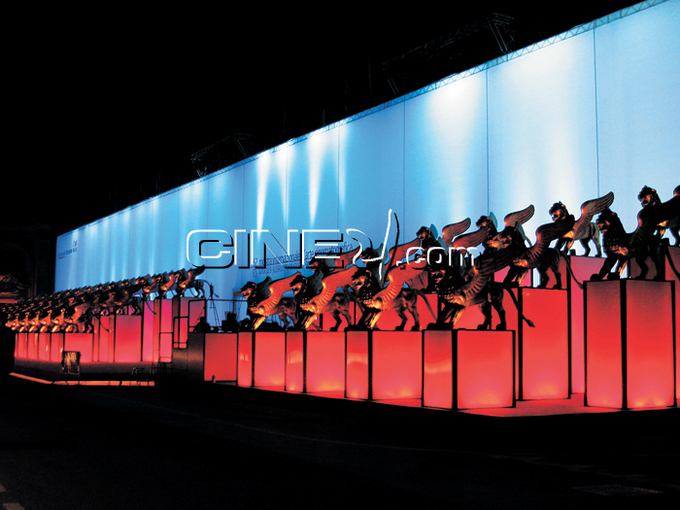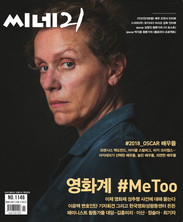주요 영화제들은 모두가 이 선반에서 저 선반으로 미친 듯이 사재기하러 돌아다니는 영화 슈퍼마켓과 같아야만 하는가? 아니면 여전히 옛날의 부티크 분위기를 되찾을 수 있을까?
올해 11년 만에 베니스영화제(8월31일∼9월10일)를 다녀왔다. 솔직히 기대되는 일이 아니었다. 1994년, 마지막에 갔을 때의 기억이 좋지 않았다. 너무 비싸게 받는 호텔이나 습한 날씨는 그렇다 치더라도, 상영조건은 학생영화제와 비슷한 수준인데다가 여러 차례 상영회에서는 전기가 끊겨버렸고, 프레스센터의 시설은 제대로 된 게 하나도 없었다. 동료들은 새로운 집행위원장 마르코 뮐러의 지휘하에 처음 열린 지난해 영화제에서 돌아와 고생한 얘기들을 들려줬다. 지연 상영, 혼란 그 자체인 상영 스케줄 등등. 본인은 비행기 타고 베니스까지 가서 보트를 타고 석연치 않아 하며 행사가 열리는 길다란 섬, 리도로 갔다. 열흘 뒤 이 걱정들을 되삼킬 수밖에 없었다. 조직은 나무랄 데 없었고, 스탭들은 충분한 도움이 되었다. 심지어 안전요원들조차 상냥했다. 올해 베니스영화제는 광범위하게 선정된 국제영화제 프로그램을 즐거운 환경에서 관람하고, 소화하고, 동료들과 토론할 기회를 갖는 것이 아직 가능하다는 것을 증명해줬다.
물론, 베니스라는 배경이 한몫하는 것은 사실이다. 관광객이 좋아할 낭만으로 가득 찬 베니스가 보트로 30분 거리에 있고 리도섬에서도 대부분의 사람들이 자전거를 타거나 걸어다녀서 여름휴가 분위기가 난다. 상영관은 모두 몇백 미터 안에 있었다. 이곳은 각지고 현대적인 빌딩들로 가득한 추운 베를린이나 크루아제트 거리 주위로 길게 펼쳐진 북적거리는 칸, 쇼핑몰과 넓고 기능적인 거리의 별 특징없는 토론토, 영화제 전체를 집어삼켜버리는 광대한 도쿄와는 너무 다르다.
베니스의 편안한 분위기에 필적할 만한 다른 주요 영화제로는 로카르노밖에 없다. 그렇지만 로카르노영화들의 재미는 베니스의 반만큼도 안 된다. 그리고 영화제에 가는 건 다름아닌 영화를 보기 위한 것 아닌가. 집권 2년째인 뮐러는 나름의 확신을 갖고 용기를 내 영화편수를 늘리지 않고 오히려 줄였다(다른 영화제 프로그래머들도 명심했으면 좋겠다). (다른 영화제들처럼) 베니스에도 형편없는 작품들이 충분히 있었고, (역시 다른 영화제들처럼) 대작은 그리 많지 않았다. 그렇지만 영화가 실패작인 경우에도, 적어도 재미있게 토론하고 쓸 수 있는 것들이었다.
그리고 어떤 영화제든간에 이런 점을 이루고자 하는 것이 틀림없다. 즉, 사람들이 즐겁게 감상하고 토론하고, 새 와인처럼 마음껏 맛볼 수 있는 온화한 환경에서 영화를 상영하는 것. 쉽게 찾아갈 수 있는 상영관에, 이틀이 넘는 동안 한 영화를 여러 번 상영할 때 그것은 가능했다. 베니스는 공식 마켓이 없다. 사업 얘긴 두개의 주요 호텔, 즉 엑첼시어와 데방의 테라스에서나 가까운 레스토랑에서 진행된다. 솔직히 말하면 베니스에서 성사되는 계약은 별로 없다. 큰 영화들은 (점차 늘어나는 유럽과 아시아의 바이어들과) 대규모의 미국 바이어들이 모인 토론토에서 며칠 뒤에 상영될 것이기 때문이다.
뮐러는 공식 마켓을 원하고 있으며, 얻지 못한다면 사임할 것이라고 협박하기도 했다(그렇지만 실비오 베를루스코니가 내년 이탈리아 선거에서 이기지 못한다면, 어쨌든 뮐러는 그 일을 그만둬야 할지도 모른다). 리도에 새로운 영화제 단지를 세울 계획도 있다(정치가들이 여전히 돈 때문에 논쟁 중이긴 하지만).
개인적으로 뮐러가 마켓을 얻거나 영화제가 새 건물을 세우지 않았으면 하는 바람이다. 이번해 베니스는 영화제라는 것이 아직도 거대면서도 친밀할 수 있다는 것, 일이 많으면서도 부담스럽지 않을 수 있다는 것, 그리고 모든 사람에게 모든 것이 되어주려고 애쓰지 않아도 된다는 것을 증명해줬다.
Do major film festivals have to be like celluloid supermarkets, with everyone rushing from shelf to shelf on a frantic shopping spree? Or can they still recapture the boutique feel of old?
This year I went back to the Venice Film Festival (31 Aug.-10 Sept.) after a gap of 11 years. Frankly, I wasn't looking forward to it. Memories of my last visit, in 1994, were not good: apart from the overpriced hotels and humid weather, the screening conditions had been more like a student film festival's, power cuts had blacked out several shows, and press facilities were lackadaisical.
Colleagues had returned from last year's festival, the first under new head Marco Mueller, with tales of woe: delayed screenings, chaotic scheduling, and so on. I flew into Venice, and took a boat to the Lido - the long island on which the event takes place - with my heart in my mouth.
Ten days later, I was eating my words. Organisation was impeccable, staff helpful and even the security men were pleasant. This year's Venice festival proved you can still watch a broad selection of international cinema in pleasant surroundings and have a chance to digest the movies and discuss them with colleagues.
OK, the setting helps. Venice, with all its touristy romance, is only half-an-hour away by boat, and on the Lido itself most people cycle or walk, giving the whole event the feel of a summer vacation. And the screening venues are all within a few hundred metres. This is very different from wintry Berlin, with its angular, modernistic buildings; bustling Cannes, spread the length of the Croisette; anonymous Toronto, with its shopping malls and broad, functional streets; or vast Tokyo, which swallows its festival whole.
The only other major festival which can match Venice's relaxed vibe is Locarno - but the films there aren't half as interesting.
And we were there for the films. In his second year, Mueller had the courage of his convictions and showed less movies rather than more. (Other festival programmers, please take note.) There were plenty of duds (like any festival), and not many masterpieces (ditto), but even when the movies didn't work, they were at least interesting to write and talk about.
That, surely, is the point of any festival: to present movies in clement surroundings where they can be appreciated, argued over and swilled around the palate like new wine. With multiple screenings of any one movie over a couple of days, in easily accessible venues, that was possible.
Venice has no official market: business is discussed on the terraces of the two major hotels, the Excelsior and Des Bains, or in nearby restaurants. And, truth be told, few deals are ever cut at Venice - the major movies are generally shown a few days later at Toronto, where U.S. (and an increasing number of European and Asian) buyers congregate.
Mueller wants an official market, and has threatened to resign if he doesn't get one. (Though if Silvio Berlusconi doesn't win next year's Italian election, Mueller may well be out of a job, anyway.) There are also plans to build a brand new festival complex on the Lido. (Though politicians are still arguing over the money.)
Personally, I hope Mueller doesn't get his market, or the festival its new building. This year's Venice proved a film festival can still be big but intimate, eventful but unpressured, and not try to be all things to everyone.


